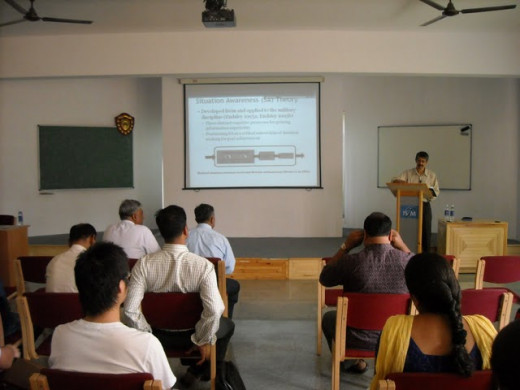I Want to Become an Adjunct Professor

A Brief Overview of the Profession
Adjunct professors are college level educators responsible for teaching a course, although in a non-tenured role. If you like the idea of teaching part-time, being an adjunct professor might be something that you'd enjoy. The requirements needed to become an adjunct professor include a graduate degree in any field of interest, preferably a doctorate. Working as a teaching assistant will contribute immensely to your career as the experience you gain in this position is highly valued.
Please be advised thought, the adjunct professor is not to be confused with a full-time tenured professor or one who is on track for getting tenure. A tenured professor has a permanent teaching position at a college or university for life until he or she reaches retirement, while the adjunct professor typically teaches for a contractual period of time and is neither tenured nor given the opportunity to obtain it. They are also frequently referred to as assistant professors or associate professors. Chiefly, it is essential to consider that, as an adjunct professor, you will not be paid a salary, but are compensated per course. The amount you receive is influenced by your level of education and field of expertise. Such a position is beneficial to those who desire to take on additional roles within their fields. The therapist who runs a practice and teaches a course or two in child development at the local community college, or the nurse who works at the hospital, but teaches nursing program classes at the university are some common examples of the typical adjunct professor. Most adjunct faculty work part-time.
In most cases, the adjunct professor can obtain a teaching position with a master's degree. To become an adjunct professor, it will be necessary for you to get a graduate degree in the subject that you plan to teach, such that if you'd like to teach college level English or biology courses, for instance, then you should complete at least a master's in those areas. As you will be able to gain entry into professorship with a master's degree, this typically will limit you to educating at community colleges. It is the doctorate degree that is most preferable in academia for professors teaching at all levels and will grant you the maximum amount of opportunity in this field. With a Ph.D, you'll be better qualified to compete in the selection process, as you will be able to educate students enrolled in four-year universities.
Teaching experience at the college level provides an excellent way for you to increase competitiveness of your curriculum vitae. Many students, while during the course of attaining the graduate degree, decide to take on positions working as graduate teaching assistants (GTAs). These are paid educational jobs in which you'll be responsible for teaching certain lower-level courses in your particular area of study, helping undergraduate students during specified office hours and supervising exams. Besides teaching experience, you'll gain invaluable training while being mentored by faculty members.

Video: The Five Best and Worst Things About Being an Adjunct Professor
Job Outlook: Show Me The Money!
The American Association of University Professors (AAUP) reports that tenured positions make up only 29% of all college professors in the United States. Tenured professors are no longer the norm; competition for tenured positions is extremely fierce. Most professors working nowadays are part-time and full-time adjuncts- more than 50% of all professors. Ninety-percent of those at for-profit colleges are adjuncts.
Adjunct professors report that they make anywhere from $2000 - $3,000 per course on average. Typically health or life insurance is not included, although some colleges do provide it. The amount adjuncts make tends to vary with respect to field specialty, education, institution and where you work. In New York for example, non-tenure track professors are paid about $75,793 annually while those in North Carolina earn $51,654 per year, as of 2019 (ZipRecruiter). Law, Finance, Economics and Engineering are the highest paying subject areas in post-secondary education, while Social Work is one of the lowest (Department of Labor).
Many adjunct profs teach a number of different courses each term at several campuses simultaneously. Courses may be cancelled for low enrollment, and new contracts are drawn up every semester. Unfortunately, a growing number of college teachers are finding it difficult to make ends meet. In fact, it is not uncommon for adjunct professors to be recipients of public assistance in the form of food stamps and medicaid.

"...about three-quarters of the faculty in higher education are nontenure-track, either adjunct, contingent—some are part-time, some are full-time. But across the board, we are paid less than our tenure-track colleagues. We have few, sometimes no benefits, sometimes no office space, very little time to meet with students. Many of us end up having to work multiple jobs at different campuses just in order to make ends meet." - Louisa Edgerly, Seattle University Adjunct Professor (DemocracyNow interview 2/25/15)
National Adjunct Walkout Day

What would it be like if all adjunct faculty members on college campuses across the country just up and decided to walk out of classes? Well on February 26, 2015 that is exactly what happened. With the aid of Service Employees International Union, college teachers left their teaching posts in protest for the first time in history. At some campuses like Seattle University, teachers walked out of classes in droves, while others decided to take a different approach to protest by conducting teach-ins and sit-ins. Some teachers sat together doing their work in various areas on campus, as a way of showing that adjunct faculty have no offices.
Before the walkout, few people were aware of the precarious situation of adjunct professors, students included. Adjuncts were largely invisible. A student at the University of Arizona, Cynthia Diaz stated that she was always concerned about her courses and doing well in them. She had no knowledge about the low wages her professors were being paid. Neither did she know that most teachers at her school were, in fact, adjunct faculty. She spoke to a large crowd of protesters at the university saying, "We know what our teachers are going through, and we want to change that."
Very little has changed. Still, adjunct professors are a committed group of educators who care for their students and the subjects they teach. Being paid only for the actual hours they are teaching in the classroom, non-tenured college professors receive no compensation for other duties such as meeting with students outside of class, grading student work and preparing for courses. It is a no-frills type of position where you haven't an office and oftentimes receive teaching assignments after the term has already began.
The Need for Adjuncts is Ongoing
Enrollment in colleges is expected to continue to increase, so will the demand for knowledgeable teachers. The Department of Labor, Bureau of Statistics reports that professor positions will grow "11% from 2018-2028, faster than average for all occupations." Most of these openings will be for part-time, adjunct professors.
Further Resources
If you are interested in learning more about becoming an adjunct professor, check out the following resource:
Bureau of Labor Statistics, Occupational Outlook: Post-Secondary Teachers
© 2012 Aunice Yvonne Reed







